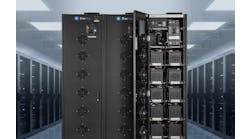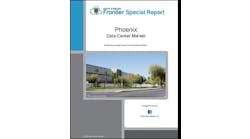JLL Data Center Executive Forum Gathers Thought Leaders to Address Industry's Most Urgent Challenges
The month of April saw 100 leaders in the data center industry gathered together in Nashville, Tennessee for the JLL Data Center Executive Forum to discuss challenges and opportunities for the industry in 2024.
Discussions focused on many of the issues that have been top of mind for data center builders and operators, as the industry has pivoted to address the primary issues that the sudden demands for AI and related technologies have placed on the data center business.
It's important to note that the Forum was run under the Chatham House Rule, which basically establishes that attendees can make use of the information shared, but cannot directly attribute it to a particular speaker.
The goal is to encourage an open discussion; and for the purpose of media coverage, such as this story, attributing content to particular speakers was not permitted.
AI Market Dynamics
It's not surprising that the Forum led off with a discussion of generative AI market dynamics, and went right into the impact of the current trends on major data centers.
The initial conversation revolved around the data center and AI industries, with speakers sharing insights on growth, future prospects, and strategies for attracting and retaining talent.
They also discussed the rapid growth of data centers, energy consumption implications, and the need for creative solutions to address these issues.
The importance of focusing efforts on developing sustainability and metrics best practices, that adapt as the industry changes, was also highlighted.
The speakers opined that staying ahead of the curve on this topic will allow the industry to lead and innovate when concerns of governance and sustainability are addressed.
Perspectives on AI Energy Requirements
There were also important conversations at the Forum centered around the latest advancements and obstacles in the data center sector, particularly in the AI era.
The change in perspective for the industry was highlighted, as some of the speakers shared their experience working on data center projects since the 1980s, and discussed the impact of AI on energy requirements.
Attention was paid to the simple fact that AI and other new requests are consuming unsustainable amounts of power, and how the industry needs to address this issue and consider any appropriate option for improving the efficiency and the effective use of power.
Location, Location, Location
The Forum also examined how the data center market is experiencing a supply and demand imbalance, with Northern Virginia remaining a dominant hub.
Speakers noted how enterprise customers are increasingly demanding colocation services; and are, in many locations, in competition with each other and the hyperscalers for available space.
While return on investment is crucial for multi-tenant applications, the discussion noted how the choice for operators is now often between the simplicity of a single tenant on a long-term contract, or potentially greater profitability supporting multiple enterprise customers.
The Forum discerned how developers must provide impact papers and address community concerns, while long wait times for power reports are a challenge.
Taxes, jobs, and community impact were cited as complex issues in data center development, requiring careful planning and collaboration as essential elements for success.
Shifting Views on Site Selection
Another interesting discussion point at the JLL Data Center Executive Forum was how the industry is changing when it comes to site selection.
It was pointed out that in years past, hyperscalers were focused on regionality, i.e. being able to expand in major markets where they may already have had a significant footprint.
Then as now, space to grow, fiber connectivity, and power availability were the king considerations - especially back when power availability might have meant only another 50 megawatts (MW).
Or perhaps some decisions might have tilted toward particular locations based on their potential tax incentives.
It was then pointed out that now, those same operators are looking for sites that encompass a huge amount of space - potentially thousands of acres - and that their minimum power requirements are likely now in the 300-500 MW range.
The Forum concluded that simple availability is now driving many decisions - and that there's now the potential for smaller cities to emerge as hubs for AI use cases handling region-specific operations.
The event's consensus was that such outcomes should improve the data center industry's ability to make operations more efficient.
Energy Partnerships are Key
Additionally, speakers at the JLL Data Center Executive Forum highlighted the importance of understanding how utilities work, and contracting properly to reduce risks in energy partnerships.
The importance of being able to help utilities manage grid stress during peak demand and other emergencies was noted.
Discussion also focused on technologies such as microgrids, energy storage, and load shaving solutions as mainstream options to keep data centers performing as good citizens for their utility partners.
Forum participants further observed how the fact that some power utilities are limiting the construction of new data centers to only those that come with their own power plant is a telling one.
Speakers acknowledged that there is a practical limit to how quickly data center power can be delivered.
Where the investment in power infrastructure is being made - and where the ability to actually transmit power resides - were also examined as factors that are changing the shape of data center energy discussions.
It’s All About the People
One of the more interesting points of conversation at JLL Forum was focused on the need to bring new people into the data center industry.
To wit: Given the small size of the industry, we find ourselves in a business where everybody knows everybody, and the talent pool of experienced candidates is limited.
Significant lateral movement is found as new entities crop up: new divisions are launched, and new technologies are addressed. The need to increase the pool of potential recruits, be it from colleges, trades, or other industries, is clear.
Establishing clear lines of recruitment among women and minorities will provide another method to address the future needs of the data center industry.
Focus on Talent Acquisition
Forum participants acknowledged that talent acquisition is a real problem, as there is a logical limit to industry growth if the primary staffing method is cannibalizing another industry player.
As greater workloads are placed on data centers it will become necessary to broaden the scope of employee outreach and bring fresh eyes and a new generation into the industry.
Diversity, equity, and inclusion (DEI) principles are still important considerations for the industry. This is being made clear when you examine new data center proposals and investments.
Speakers noted how significant earmarks are being made for educational programs and investment in local training.
The need to find methods for developing staff from within local communities for data center projects was also examined - and not just in the trades for construction and development cycles, but also for the technology skill sets necessary for ongoing operations.
The Data Center Industry's Future Is Now
While this article just lightly touches on the full day of discussions at the JLL Data Center Executive Forum, one thing is clear: the data center industry is changing at an exceedingly rapid pace.
From a business where projecting demand for capacity and power was once a fairly straightforward task, it has now become a sector where demands are growing, in many cases, exponentially.
As demands for the capabilities the data center represents grow quickly, the technology is changing just as fast, and now brings increasing demands for space, power, cooling, and acceptance.
Meanwhile, focus on the impact of new data centers on communities has never been more in the public eye.
As the old expression counsels, "May you live in interesting times." For the data center industry, those times are certainly now.






